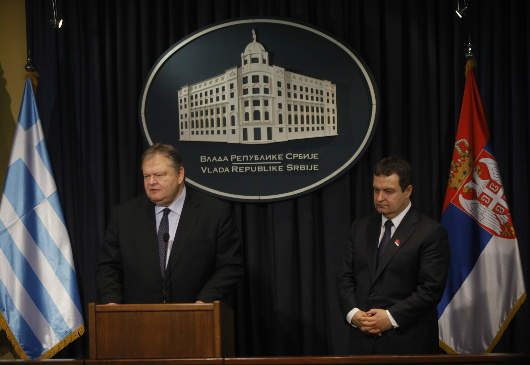 IVICA DAČIĆ: It is a particular honor to have the opportunity today to host Greek Deputy Prime Minister Evangelos Venizelos, and I am greatly pleased that Serbia’s accession negotiations opened officially and formally on 21 January, under the chairmanship of our guest here today, Evangelos Venizelos, the Deputy Prime Minister and Foreign Minister of Greece, and that, in general, this whole process started under the EU Presidency of Greece, our great – perhaps our greatest – friend in the EU.
IVICA DAČIĆ: It is a particular honor to have the opportunity today to host Greek Deputy Prime Minister Evangelos Venizelos, and I am greatly pleased that Serbia’s accession negotiations opened officially and formally on 21 January, under the chairmanship of our guest here today, Evangelos Venizelos, the Deputy Prime Minister and Foreign Minister of Greece, and that, in general, this whole process started under the EU Presidency of Greece, our great – perhaps our greatest – friend in the EU.
As you know, we will do everything, despite being in the run-up to elections, to make sure Serbia keeps on track with the European integration process; that is, to make sure that the elections do not impact the process of integration and reforms that Serbia must carry out, and, of course, the dialogue with Pristina.
We want Serbia to fulfil all the technical prerequisites and criteria as soon as possible, in the sense of realizing our potential for accession to the EU, and for this to happen by 2018. And by 2020, we estimate that, within this seven-year period, the process of our accession to the EU will have been completed.
I would also like to note that our bilateral relations are excellent, and once again I would like to express my great gratitude to Greece for understanding Serbia’s positions, for the support Greece has always offered us and vice versa. Serbia sees Greece as its great friend, and of course we will always stand by our friends.
We want our bilateral relations to develop not just on the political level, but also in the economy, culture, education, sports, science, etc. Greece is one of the biggest investors in Serbia. It is estimated that Greek direct investments come to over €2.5 billion.
On behalf of the Serbian government and Serbia, I also want to wish the Greek people and the Greek state all the best, and I express the hope that together we should seek our common interests so that we, the whole region, can become as strong as possible.
Thank you.
E. VENIZELOS: I thank Prime Minister Dačić for the opportunity he gave me to talk to him in my capacity as President of the Council of the European Union during this semester, as well as in my capacity as Deputy Prime Minister and Foreign Minister of Greece.
I am pleased and moved that 21 January 2014 has now gone down in Serbian history as the day on which the Intergovernmental Conference was convened to officially declare the opening of Serbia’s accession negotiations with the European Union, and this happened under the Hellenic Presidency. I had the personal honor of chairing that Intergovernmental Conference.
The negotiating framework within which this process is being carried out is well known, and the Hellenic Presidency’s goal is now to maintain the pace, to ensure the opening of as many negotiating chapters as possible, as soon as possible, in order to achieve the legitimate goal, set by Prime Minister Dačić, of the completion of Serbia’s accession by 2020.
Of course, the negotiation process does not have just political content. It has quite complex technical content as well. On a bilateral level, Greece is prepared to provide all possible assistance and know-how to the Serbian government, to Serbian administration, if it is needed.
Following the six months of its Presidency as well, Greece will always take care, at the Council of the European Union, on the intergovernmental level, to make the necessary moves to maintain the pace of Serbia’s accession course.
The Serbian political leadership have taken courageous decisions that concern the stability and perspective of the whole Western Balkan region.
The opening of the accession negotiations and, even more so, Serbia’s accession to the European Union will function as a catalyst in the wider region. I am pleased that the run-up to the elections is proceeding at a high level of political culture, and the Serbian political forces do not want to disrupt in any way the negotiations with the EU or the country’s accession perspective.
On a bilateral level, Prime Minister Dačić and I reaffirmed the excellent quality of our bilateral relations. Our relations have a solid foundation in history, culture and sentiment, but also a very specific practical content – not just political, but also economic.
I thank Prime Minister Dačić for noting the presence of Greek enterprises and Greek investments in Serbia. We want this to continue. Despite the economic crisis in Greece, and following the economic crisis, Greece is a strong European economy with a serious role in the region. We are the third foreign direct investor in Serbia, and we want this to continue. We want there to be even closer economic relations between the two countries.
I conveyed to the Prime Minister the greetings of the Greek Prime Minister, and we reaffirmed our will to organize the second high-level Intergovernmental Meeting between the two countries, in the second half of 2014, after the completion of the Hellenic Presidency.
Once again, I thank the Prime Minister for his hospitality and for the substantial and practical talks we had.
February 18, 2014


